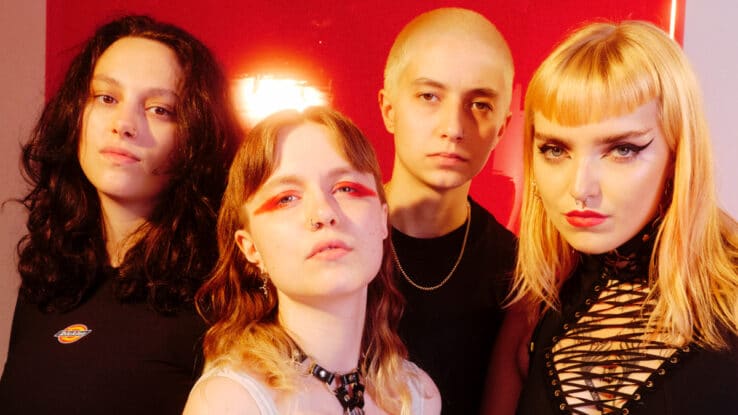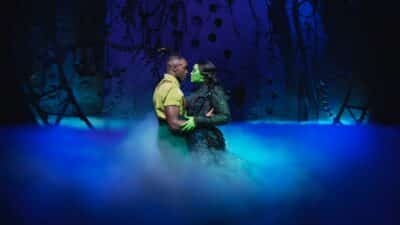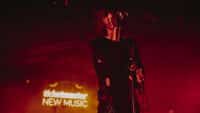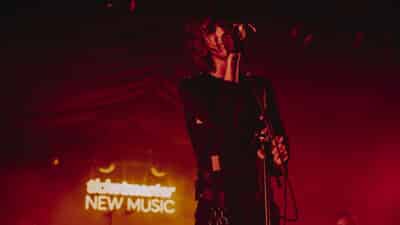Interview

Interview
Witch Fever: “We’re getting heavier. And we’re into it.”
The hardcore band talk riders, religion and the accidental creation of their debut album
Witch Fever are excited to be playing O2 Forum Kentish Town in November – especially because they might get a charcuterie board.
“We don’t normally get a good rider,” explains guitarist Alisha Yarwood. “But when we play the nice venues we get like, you know, the whole spread.”
“Not just sandwich stuff and crisps…” adds singer Amy Walpole.
“I like when we get pots of Marmite,” pipes up bassist Alex Thompson. “Big up Marmite…”
“…And that place we went to the other day where we got scratch cards,” says drummer Annabelle Joyce. “I won a fiver.”
Yarwood snaps her fingers. “Charcuterie!”
There’s an excitable, slightly giggly energy from Witch Fever that you maybe wouldn’t expect after listening to their music. On debut album, Congregation, they tackle the insidious effects of a religious upbringing, the lens through which it forces you to observe your own puberty and the way it warps the relationship you have with yourself. Often affixed with the ‘doom punk’ label, their music takes inspiration from many different hardcore subgenres, evading classification as the group experiments and evolves. They’ve opened for My Chemical Romance and are gearing up for a tour with Hot Milk. Rising stars of the hardcore scene they may be, but Witch Fever are vocal about the fact that they’re doing it all first and foremost for their own enjoyment.
We caught up with the band to talk about the writing of Congregation, why Gen Z aren’t afraid to speak out against the church, and why the best things often happen by accident.
When did you guys start playing music together?
Amy: Alisha and Annabelle met first.
Alisha: In 2016. We were the OGs. And then we did our first gig that August. Then like a year later, two members of the band left and Alex and Amy joined, and then we’ve been this [line-up] ever since.
Were you career-minded about the band even back then in that first line-up?
Alisha: I guess so. I didn’t really know if it would go anywhere though.
Annabelle: Yeah, it wasn’t like a serious thing. Although, saying that, I had wanted to be in a band since, like, high school. But just for fun, not playing seriously.
Alisha: We booked a gig before we had a singer and then someone who was in the band at the time got in touch with Amy. And then we were like, “Let’s go.”
Where did the name Witch Fever come from?
Amy: It was an old guitarist who came up with it, and it just fit. She left a year later and we just carried on with it because it fit our vibe.
What was the motivation behind the sound you settled on?
Alisha: We evolved with the music that we’ve been listening to. You can tell the difference.
Alex: When I joined the band, I wasn’t really into heavy music at all. I remember joining Witch Fever and I was like, “whoa, this sh*t is heavy.” But what we were writing then is not even a scratch of how heavy we are now. We all kind of just bounce off each other and we’re all into without there really being a goal of what the genre is gonna be.
Is there a genre you would say you more or less ascribe to?
Alisha: I mean, doom punk’s been thrown around. But none of us really listen to doom.
Alex: I do.
Annabelle: I do.
Amy: I do.
Alisha: Oh, sorry. Everyone listens to doom apart from me. But there’s a bit of metal in there, a bit of hardcore, a bit of post punk… It’s kind of an amalgamation of loads of different things.
Doom punk gets mentioned a lot with Witch Fever. Is it a description you like?
Amy: Well, we came up with that. I was the one that came up with that. And now I keep seeing loads of other bands putting “doom punk” in their bio, and I’m like, really? I still like doom punk, I think it fits.
Alisha: I think the newer stuff is heading more into metal. I think we’re definitely getting heavier rather than more punky. But I’m into it.
Annabelle: I think with our stuff there’s probably always going to be elements of punk, even if we do go heavier.
Why do you think your music has leaned heavier as time’s gone on?
Alex: On a personal level, I just got into heavier music. And I think being around peers that play in heavy bands… I’ve gone to see them and I’m like, “Whoa, this is really good.” I think my tastes have just changed slightly. I think you’re always looking to push your genre further and push your sound more, and the most organic way for us to do that is to push it in a heavier direction.
Amy: It’s more fun to play live.
Alex: Yeah, it is fun to play live as well.
Amy: It’s not necessarily a conscious decision. It just happens like that. That’s what we always end up writing in the room.
What mainly motivates you to make music?
Alisha: It just feels good.
Amy: Just to enjoy it, pretty much. I mean, it helps that we have audiences that enjoy it. I think if we were seven years down the line and everyone hated our music, it would not be as fun.
Alex: I think right now it’s just what we do. I don’t really think of it on a deeper level of like, why am I doing this.
What do you think you might be doing if you hadn’t ended up making music?
Amy: I already know what I’d be doing. I’d be working in a museum or a publisher’s or something. I’d be writing, probably.
Alex: Well my parents wanted me to be a lawyer… But I think I’d probably be in fashion.
Annabelle: I don’t know. I’d just be out there vibing.
Alisha: Same.
You released your debut album, Congregation, last year. Can you tell me a bit about the process of putting that record together?
Alex: Honestly, we were just writing songs and we didn’t have a solid concept in mind. But when we stepped back from it, we were like, “oh, everything links”. So I think we were quite lucky. Honestly, going into it, we were just trying to write enough songs to get an album. We recorded it in, like, a week and a half as well. It was all super quick. It’s almost like a concept album, in terms of the lyrics.
Amy: Yeah, it was an accident. I didn’t set out for the lyrics to be like that, to all come together in that way. It just happened by accident. And then we pulled it all together, and I was like, “Oh, shit. Okay. I guess that’s what the album is about then.”
Why do you think you were led in such a specific direction with the songwriting?
Amy: Religious trauma still crippling me as an adult, basically. It just comes out. I can’t help it. It just happens. We’re writing a second album at the moment, and I’m trying to stay away from it… or at least to do things differently and have the lyrics be more evolved than they were on Congregation… But it’s hard because I’m in the habit now. I’m in the habit of writing about that.
Religious trauma is something that we’ve seen a lot of musicians start to speak out about in recent years. Why do you think it is that this generation of artists have started to be so vocal about it?
Alisha: I think religion has become less linked with the state and with education than it used to be. It still sort of is. As it’s becoming less linked, and as atheism is becoming more of a thing, people are just like, “Yeah, f*ck that.”
Amy: Yeah, also I feel like the amount that social media is used now has become kind of a double-edged sword. Social media can be really sh*t, and is really sh*t, but at the same time it also like gives a lot of people a voice that wouldn’t usually have one. If you see other people talking about it, it gives you the confidence to talk about it, too.
‘I Saw You Dancing’ tackles some of those themes of religious trauma head on, and it also stands out on the album as something a bit different from what we’ve heard from Witch Fever before. Can you tell us more about where that song came from?
Amy: That song is really about when I was a teenager, being in the church. I hit puberty and I started to realise that I was being watched by men. The church I was in used to bring really horrible men in to try and reform them and sh*t. They literally just used to pick people off the street, vulnerable people, and bring them in and try and get them into the church. But some of them were not nice people. I have lots of memories of seeing men looking at me when I was prepubescent. The “I saw you dancing” part… that line is from the man’s point of view. I felt like I was constantly being watched. It’s got a voyeuristic vibe.
Alex: Yeah. I think sometimes we fall into the trap of wanting to take more risks, and thinking more things have to happen. ‘I Saw You Dancing’ is an example of how something can be really simple but really effective.
Alex: But I think it started with the baseline. I’m pretty sure I came up with that first. I’m just playing open D the whole way through. I think we were just, like, pissing around and we were like, “Oh, we could do something with that.”
Amy: It’s nice because it’s pretty simple. It’s a nice song to vibe to because the pace is pretty nice.
You’re writing your second album – what else have you got coming up?
Amy: Yeah, that’s really exciting. And we’ve got that tour with Hot Milk. Next year, we want to do loads of festivals…
Alex: In October, we’re planning on doing a writing retreat, where we’re all going to go to the middle of nowhere in Wales and make a racket for a week. I’m excited for that. Because at the minute we try and practise every Tuesday, but obviously all of us are working and it’s hard to really get into it sometimes. We’ve never actually spent that amount of time together just trying to write. I’m excited to see how we can push our sound when we have so much opportunity and no distractions. Should be fun. Hopefully we don’t kill each other.
Witch Fever will play multiple UK dates throughout the autumn. Find tickets here









